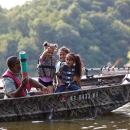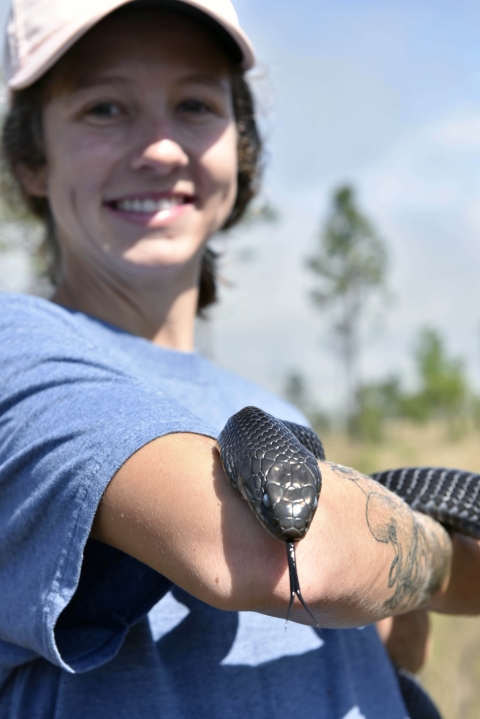Visit Us
Welaka National Fish Hatchery has an active public use program. The hatchery maintains a 16-tank public aquarium, a nature trail, and an observation tower where wildlife and birds can be observed around the ponds. With our two new eagle-cams you can watch not only the eagles but ospreys and other wildlife as well. Volunteers are constantly staffing the cameras to look for anything interesting happening on the hatchery. The hatchery’s nature trail is currently closed due to safety concerns follow a small wildfire that left many trees dead. Once the trees are removed the trail will reopen. The hatchery is developing an Archery Program that will invite experienced and novice archers to shoot 3-D targets along the archery trail.
Welaka National Fish Hatchery is just one of the many field stations of the U.S. Fish and Wildlife Service whose mission is working with others to conserve, protect, and enhance fish, wildlife, and plants and their habitats for the continuing benefit of the American people.
Location and Contact Information
About Us
Since 1871, National Fish Hatcheries have been applying science-based approaches to conservation challenges. We work with our partners and engage the public to conserve, restore, and enhance fish and other aquatic resources for the continuing benefit of the American people. Conservation is at the heart of what we do, and we recognize that we do this work for the American people–both the present generation who benefit today and future generations who will inherit our legacy of conserving America’s aquatic resources.
Welaka National Fish Hatchery is charged with producing Atlantic Striped Bass for the St. Johns River in order to maintain the population for ecological, historical and economic purposes. The hatchery also works with Gulf Coast states to produce and protect Gulf Striped Bass in rivers from Florida, Georgia, Alabama, Mississippi, and Louisiana that flow into the Gulf of America. Recently, the hatchery has begun work with two federally listed species, the federally threatened Eastern Indigo Snake and the federally endangered Florida Grasshopper Sparrow.
The Welaka National Fish Hatchery was built in 1926 and originally operated by the State of Florida. In 1938 the hatchery was transferred to the U.S. Fish and Wildlife Service. In 1926, the hatchery started out as a deer and quail farm. When the U.S. Fish and Wildlife Service took over operation in 1938, the focus was on farm pond management rising bass and bluegill. Over the years the hatchery has seen programs come and go. Striped bass are the top fish species the hatchery raises with nearly 1 million fingerlings produced in 2024. In 2018 the hatchery began working with the federally threatened Eastern Indigo Snake. Welaka NFH grows out the snakes before they are released into the wild. Welaka NFH began working in 2019 with the federally endangered Florida Grasshopper Sparrow. Like the Indigo snakes, the hatchery receives fledged sparrows and rears them until they are released into the wild.
Tours
Guided tours of the hatchery are by appointment only, so please call our office at 386-467-2374 to schedule your tour. Welaka National Fish Hatchery is a great place for school field trips. Public and Homeschool groups are all welcome.
What We Do
The next time you go fishing, you might just catch a fish that was raised at Welaka National Fish Hatchery. Since 1871, National Fish Hatcheries have been responding to conservation challenges affecting America’s fish and other aquatic species. Producing fish continues to be an irreplaceable tool in managing or restoring fisheries along with habitat conservation. In doing so, we help provide recreation opportunities to America’s 34 million anglers who spend $36 billion annually in pursuit of their favored pastime.
Welaka National Fish Hatchery produces Atlantic Striped Bass for the St. Johns River, Gulf Striped Bass for waters in Florida, Georgia, Alabama, Mississippi, and Louisiana that flow into the Gulf of America., Channel Catfish for military bases and kids fishing events, Bowfin for the Miccosukee Tribe of Indians of Florida, Bluegill, and Redear Sunfish for recerational fishing at some of Florida's National Wildlife Refuges. The fish are stocked annually in reservoirs, lakes, rivers and coastal streams across the South Atlantic-Gulf & Mississippi Basin.
Welaka National Fish Hatchery is unique in the fact that the hatchery has programs that no other hatchery can boast about. In 2018 the hatchery began head starts the federal threatened Eastern Indigo Snake and a year later the first federally endangered Florida Grasshopper Sparrow was brought on station. You can say Welaka isn't JUST a fish hatchery any more.
Our Organization
Our Species
Welaka National Fish Hatchery is a unique facility raising more than just fish. Welaka NFH assist in the grow out of both the Federally Threatened Eastern Indigo Snake and the Federally Endangered Florida Grasshopper Sparrow. See below for all the other species we work with at the hatchery.
Projects and Research
On April 23, 2022, the USFWS joined The Nature Conservancy and other partners in releasing 26 rare eastern indigo snakes into the wilds of the Florida Panhandle. The Orrianne Center for Indigo Conservation -operated by theCentral Florida Zoo & Botanical Gardens - bred and raised the snakes for a year. The sleek, black, lengthy, and federally protected serpents then spent a second year at our hatchery, before being released into the wild. In over six years, this collaborative effort has released more than 100 indigos into their old longleaf pine habitats in Florida and Alabama.



